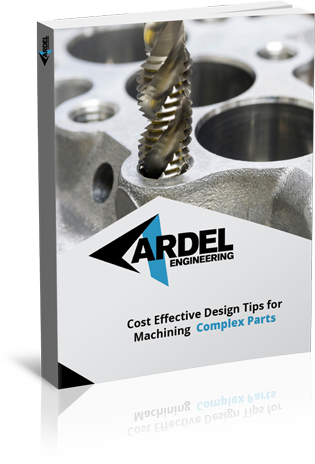At Ardel Engineering, we specialize in precision CNC machining services. As suggested by the name, precision computer numerical control (CNC) machining relies on the use of specialized computer software (e.g., CAD/CAM) and computer-controlled equipment to produce highly accurate and precise parts and products from various materials. It is an umbrella term encompassing a variety of subtractive manufacturing processes. One of our core service offerings is CNC milling.
>>Click here to learn about our other custom machining capabilities.
A Guide to CNC Milling
While most CNC milling applies to metalwork, the tools are extremely versatile and produce custom, precision parts for a wide variety of industries.
From aluminum, brass, and steel, to exotic and precious metals such as gold, iridium, and platinum, precision CNC machining can craft even the most sophisticated designs in the most particular metals.
What is Computer Numerical Control, or CNC?
Computer Numerical Control (CNC) allows a machine to be moved and monitored by computer control. The family of CNC machines is vast — milling machines, welders, grinders, lathes, routers, cutters, stamping machines, and many types of large industrial systems rely on CNC technology for precise, custom production of components.
Particular software codes, such as NC code and G-code or ISO code, work from CAM (Computer Aided Machining) and CAD (Computer Aided Design) software packages to drive CNC machines to create three dimensional parts directly from engineers’ digital designs.
CNC Milling Machines
The most widely used variety of CNC machine, CNC milling tools perform a machining process much like both drilling and cutting. At its most basic, milling uses rotary cutters to remove the necessary excess material from a workpiece as it is fed into the milling tool. It’s a popular industrial solution due to the detailed sizes and shapes that milling can accommodate.
The rotating cylindrical cutter in a CNC milling machine can move along multiple axes to create unique shapes, slots, holes, and details in a part. Most machines operate on three to five axes, allowing the most advanced tools to perform sophisticated machining with extremely complex geometries. In fact, today’s most intricate CNC projects would be practically impossible to produce with manual tooling.
Modern CNC milling machines are assembled as both horizontal and vertical machining centers, and can create precision components from plastics, ceramics, and composite materials, in addition to metals. They come equipped with technical features such as automatic tool changers, tool carousels and magazines, coolant systems, and enclosures.
Industries and Products
CNC milling has the ability to hold very tight geometric tolerances for many aspects of a part’s key features, such as diameter, true position, profile, and flatness.
With increasingly affordable tooling costs and the ability to create a wide range of complex parts, CNC milling is a popular solution for projects ranging from prototypes to full-scale fabrication of unique precision components.
CNC milling centers serve industries such as:
- Aircrafts and aerospace
- Prototypes and custom designs
- Commercial
- Maintenance
- Electronics
- Medical, both disposable and non-implantable
- Recreation
- Technology and security
- Telecommunications
- Transportation and automotive
- Industrial and O.E.M.
Mounting brackets, fixtures, precision components, housings and assemblies, struts, and structural components are all common products crafted with custom CNC machining.
For more information on CNC milling and the benefits of using this technology for your next project, visit one of our pages below:


